Storm Warning (1951)
The Dark Side of Doris Day
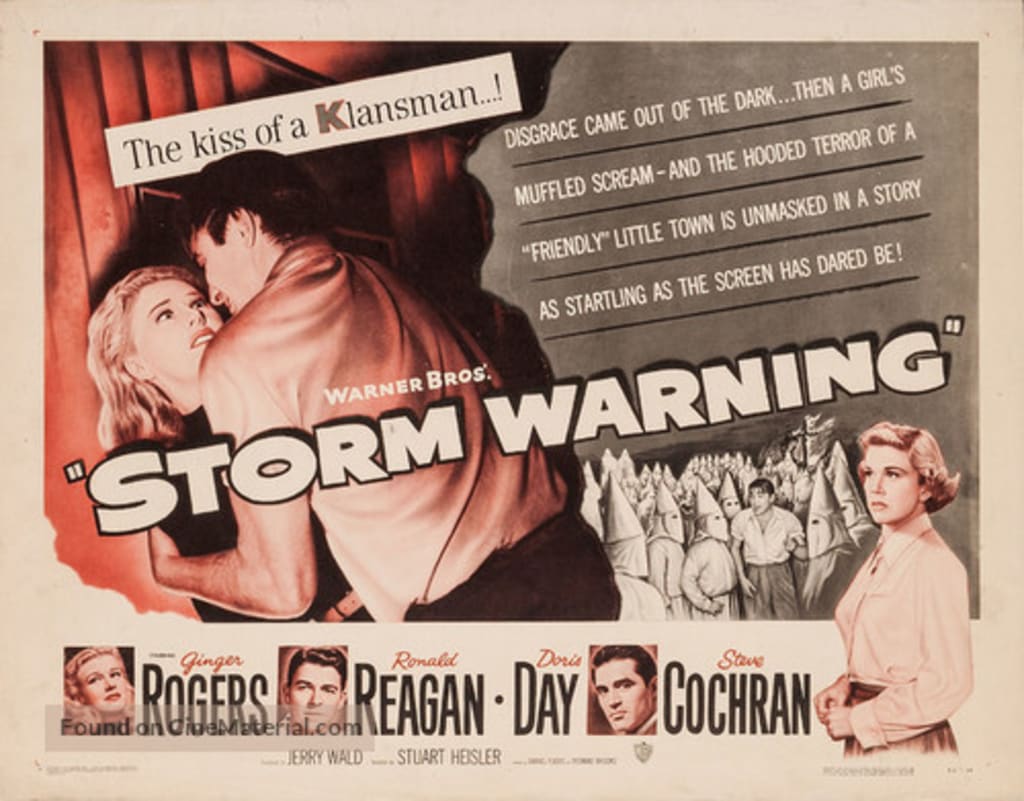
*Spoiler Alert*
It is rare to talk about Doris Day coupled with threat and menace.
Storm Warning is a dark melodrama from 1951 which features the story of sisters Marsha (Ginger Rogers) and Lucy (Doris Day).
The opening scenes are a masterclass in building suspense. At first we see Marsha engaged in cheerful banter, knocking back advances from her manager as she is getting off the train to see her sister. But the mood changes swiftly as she lands in a small town. There is rainfall. The lights of the town go out one by one and we hear the echo of her stiletto footsteps.
And the tension ramps to the point of a horrifying denouement. Marsha whipped in front of a faceless mob of Klu Klux Klan members and Lucy shot in a gun fight.
This is not a film about a freckled face tomboy. Nor is it a sophisticated rom-com with a stylish career woman. This film is dark, sinister, cruel, twisted.
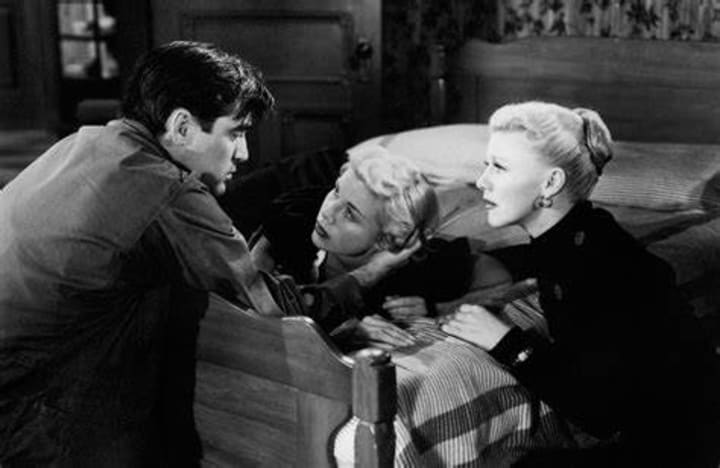
Storm Warning works on its own terms. It is a tense thriller about the misrule of violence. But it is also deeply flawed in its portrayal of small town politics. It has a blind spot.
Storm Warning is a story without an understanding of the Eye of the Storm. Storms are a disturbed state of the natural world, a disruption. But something is left untouched in this film – Black people do not figure at all. They appear as bystanders, and passers-by, but they have no speaking roles and their presence is only ever talked about in code.
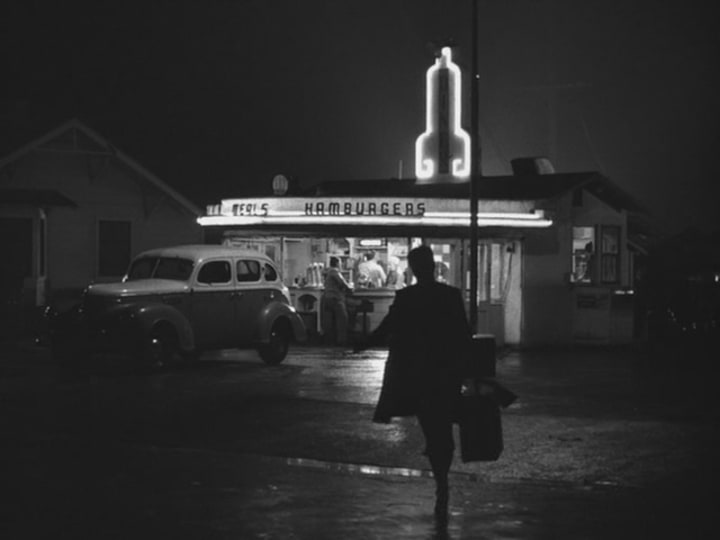
In the guise of an imaginary 1940s screen writer, I have written a great deal about how Hollywood has chosen to mistreat black and minoritised actors (see Dorothy Dandridge, or Anna May Wong). These are stories about how racism has refused to deal with the complex reality of the stars it uses to tell a limited range of stories. It shows how lives get censored. Some stories just don’t get to the screen, and that leaves us all poorer in terms of the stories we get to watch.
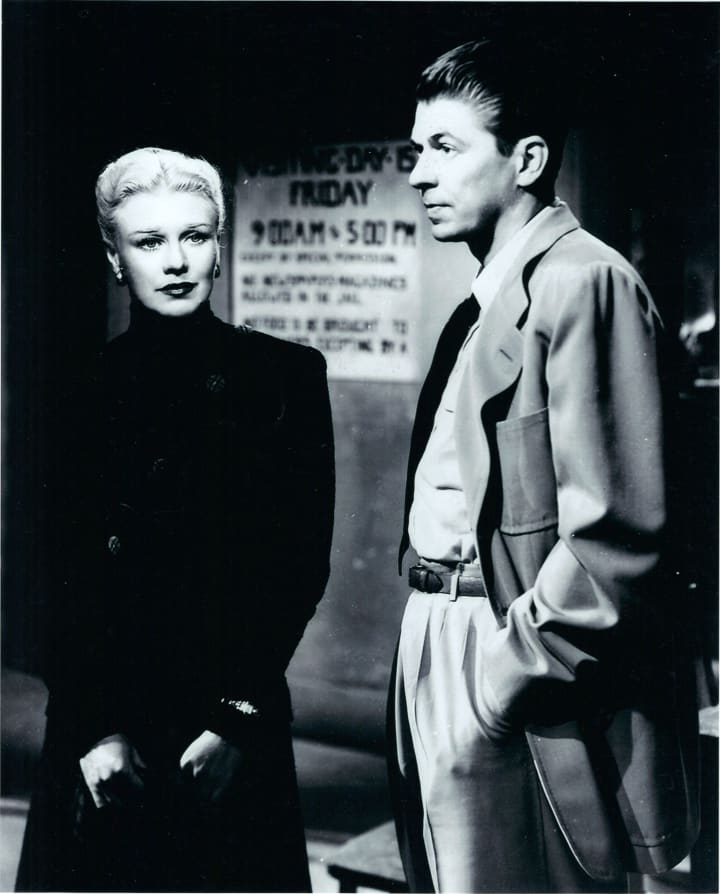
But Storm Warning (1951) is a different kind of censorship. It is a part of the process by which Black History becomes hidden, taboo, refused and then re-purposed to produce white heroes. So in Black History Month (as celebrated in US and Canada – The UK and Ireland celebrate in October), what does my imaginary 1940s screen writer make of Storm Warning?
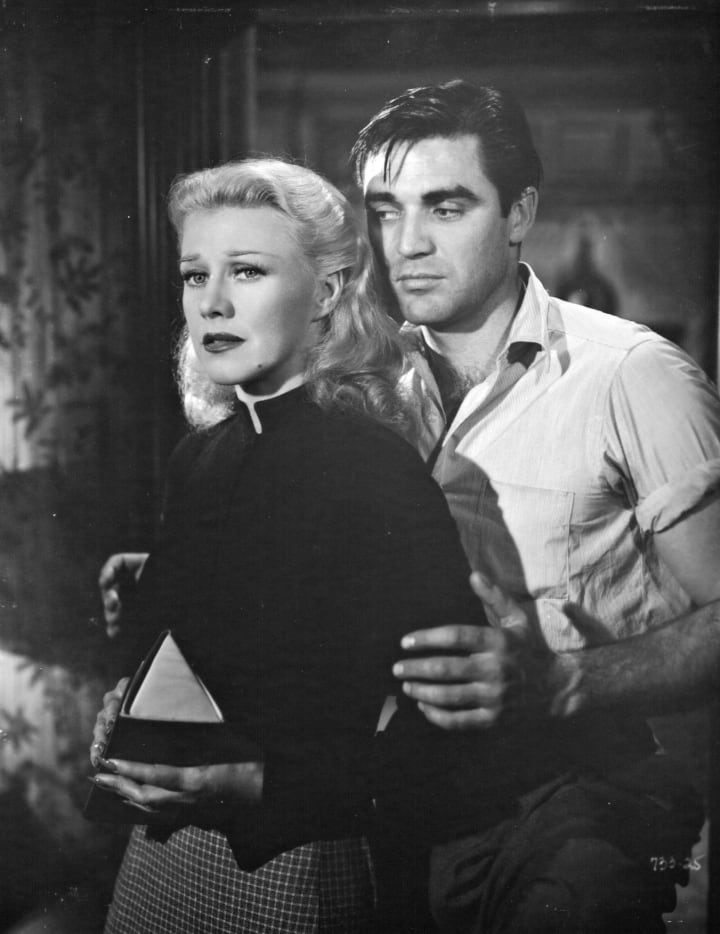
Storm Warning was not a commercial success, but it did garner critical acclaim, especially for its two female stars.
Film Daily wrote:
“Played with dead seriousness all the way, Storm Warning permits a fine selection of players to demonstrate their talents with excellent results… [the film] is potent, alert and stirring fare.”
Day’s performance was strong enough to be noticed by Hitchcock, who went on to cast her in The Man Who Knew Too Much.
So, sitting in the writing room, I’d be pretty pleased with myself. But who else would be in that room, that devised a story about the KKK that didn’t even mention their racist, genocidal agenda?
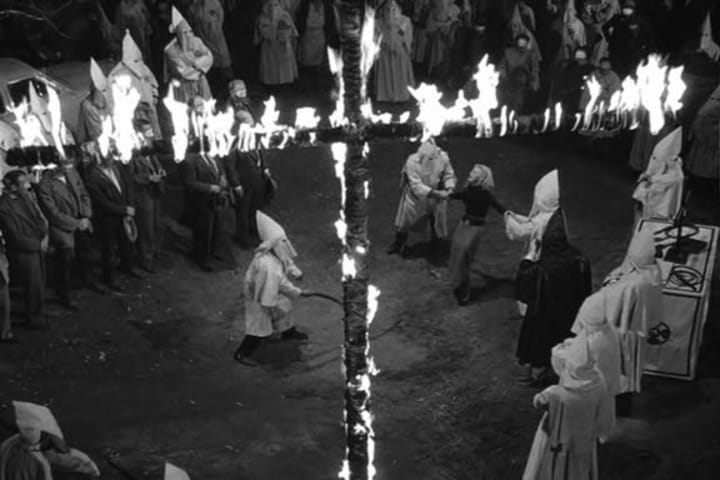
Of course, this is not a pro-Klan film, like DW Griffith’s Birth of Nation (1916). This is an attempt to show the thuggery and brutish corruption and racketeering of “hoodlums dressed up in sheets” (as described in the film).
We watch the Klan murder a journalist, threaten prosecutors, intimidate small business owners and one member attempt a rape. They are not the good guys. And the argument could be made that by not having Black people on the screen, we were also spared seeing Black people as victims of torture and violence.
But it also means we don’t get to see Black resistance and courage and the complexity of living under Klan rule.
Even worse, we only get to hear about Black people from the perception of racists:
Charlie Barr (played by Hugh Sanders), the leader of the Klan gets to say:
You have to think of all the good the Klan does. You have to think of what it would be like down here without us. Without us, a girl like you wouldn't be safe on the street at night. You have to think of that.
And what wouldn’t that girl be safe from…?
And whilst we see that she isn’t safe from KKK members, there is no redress or arguments against the underlying assumption of Barr’s comments that Black men pose a threat to White women.
And the hero is Burt Rainey (played by Ronald Regan) who rescues the girl and arrests the bad guys.
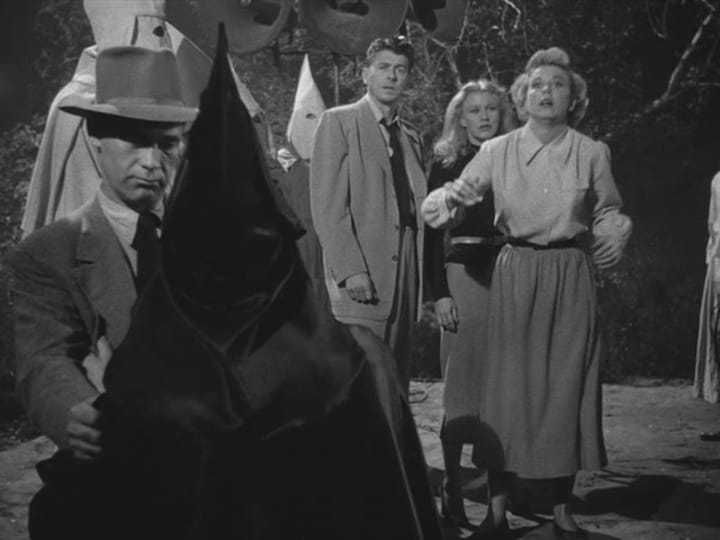
What we have here is the cinematic trope of the White Savior. This isn’t just about suggesting that Black people are protected and rescued by good White people. It is about denying Black people agency in a story that should be centring their oppression and resistance.
As Teju Cole, who coined the term “White Savior Industrial Complex” puts it:
“It is about having a big emotional experience, that validates privilege.”
And the White Savior trope is hard-baked into this form of emotional, sentimental story-telling that doesn’t even acknowledge Black lives.
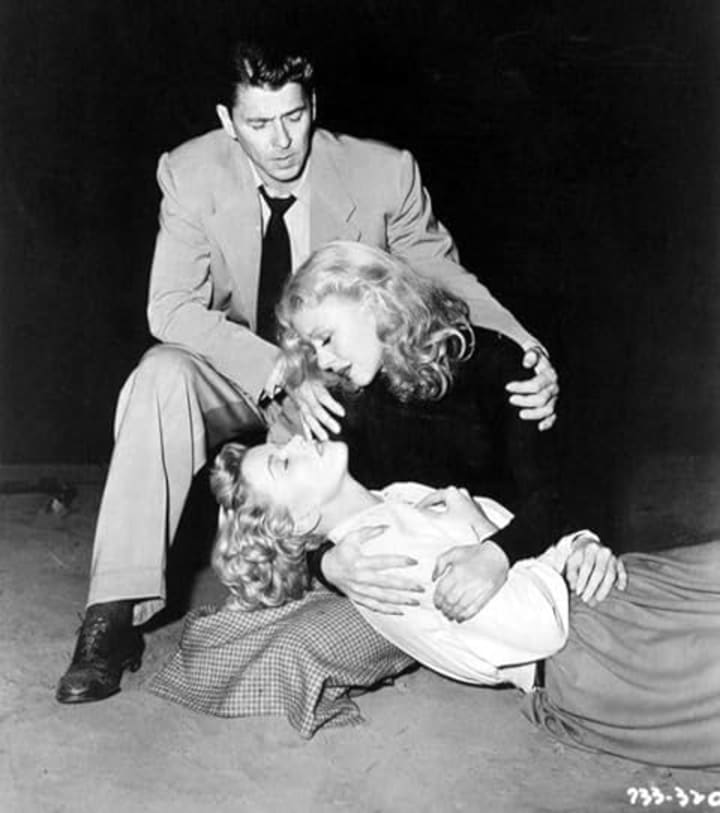
This might come as a surprise but I still liked the film. Day and Rogers were superb. But it left me uncomfortable. And it is our inability to sit with that discomfort that stifles progress.
The author, Nova Reid, makes the point about white allyship when she says:
This is about working alongside, supporting, accepting you are going to get it wrong and showing up anyway. It means accepting that anything worthy of seismic change will not happen without discomfort, consistency and a whole heap of courage.
My imaginary 1940s screen writer got it wrong, because she didn’t look around the writing room and see diverse faces. There was no one there to ask the uncomfortable questions.
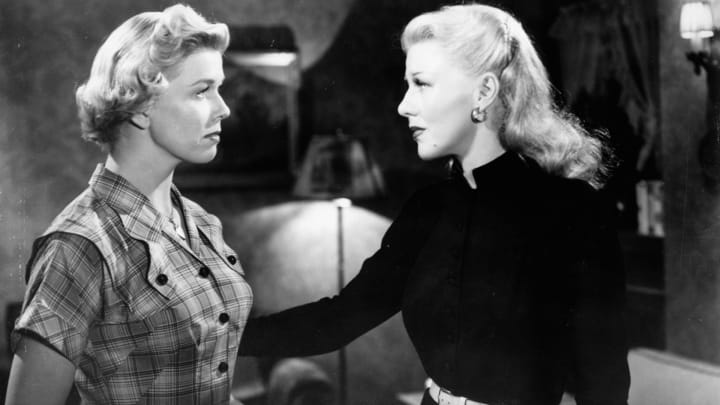
If you've enjoyed what you have read, consider subscribing to my writing on Vocal. If you'd like to support my writing, you can do so by leaving a one-time tip or a regular pledge. Thank you.
About the Creator
Rachel Robbins
Writer-Performer based in the North of England. A joyous, flawed mess.
Please read my stories and enjoy. And if you can, please leave a tip. Money raised will be used towards funding a one-woman story-telling, comedy show.
Reader insights
Outstanding
Excellent work. Looking forward to reading more!
Top insights
Compelling and original writing
Creative use of language & vocab
Easy to read and follow
Well-structured & engaging content
Excellent storytelling
Original narrative & well developed characters
Expert insights and opinions
Arguments were carefully researched and presented
Eye opening
Niche topic & fresh perspectives
Heartfelt and relatable
The story invoked strong personal emotions
Masterful proofreading
Zero grammar & spelling mistakes
On-point and relevant
Writing reflected the title & theme







Comments (12)
Thank you for sharing this with us
Released the year I was born. Never heard of this movie. The south is still very racist and it is hidden a little bit in the north, but one never knows what someone is saying behind backs or what groups they belong to. I second Randy's comment, which says it all. Your "white savior trope" is very apropos also. It's all the things in the shadows. Surprisingly many white people have no idea of the racism that is everywhere.
Kostenlose RTL-Livestreams sind eine unschätzbar wertvolle Quelle für hochwertige Inhalte. Seine Kombination aus Vielfalt, Qualität und Interaktivität macht es zur ersten Wahl für diejenigen, die der Zeit voraus sein möchten https://tvlivekostenlos.de/rtl/
Racism by omission. How can you talk about KKK, without mentioning what they are known for. This is a very interesting article
Congratulations on your Top Story 💓😘💖❤👍
Congratulations on your Top Story
Congratulations on top story :)
I'd never even heard of the movie before this. I'm so appreciative of your analysis & review which demonstrate with utter clarity how something can have such blind spots & still be used to awaken within us a clarity about our own. It also represents in microcosm the essence of what it seems my life work & calling has long been. As a white male living in the United States of America with a good education including studies beyond my masters degree who cares deeply about justice issues, especially those of gender & race, I have long recognized that I cannot be the one to take the lead on addressing these issues. But I can do all that I can to support, work alongside & from the background & in the shadows. My name probably shouldn't ever be recorded in the history books. But I will hold dear those who are who have done what they can to bring about positive change in this world. How ironic that Ronald Reagan, the one who embraced & further emboldened Nixon's Southern Strategy & long has been treated as the "American white male savior" who has left an entire political party openly beholden to white nationalists, the KKK, & the Proud Boys & given us unapologetically the political, theological & pretty much all-around abomination that is Donald Trump's presidency & continued power, influence & candidacy, ends up being the hero in this movie.
Your film discussions are always interesting. I love Doris Day but associate her with Technicolor. This sounds much less likely a fulm for her to do. I might have to check it out.
Well done! Keep pushing forward with your excellent work—congrats!
Congrats on Top Story!🥳
This is a remarkable review, in my opinion. You touched on some important points here that just left me slow-clapping in my seat. "It shows how lives get censored" just about had me in a standing ovation. Wonderfully done.